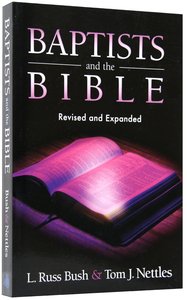Review: “Baptists and the Bible” by L. Russ Bush and Tom J. Nettles
In every generation, there are some Christian books that become classics. Their topic is urgent, author compelling, and content enriching—if not profound. These book’s reception far outstrips every expectation, and its effects ripple throughout the church.
Over the years, old ministers recommend these books to younger ones, and the books become trans-generational mainstays. These books—like John Bunyan’s Pilgrim’s Progress and J.I. Packer’s Knowing God—just have staying power, and everyone recognizes them as a classic.
Just beneath these enduring titles is another subset of books. They don’t quite attain immortality, but given their topic and timeliness, they make a unique and needed contribution to the church. Books like J. Gresham Machen’s, Christianity & Liberalism, and John MacArthur’s, The Gospel According to Jesus, appear in this category.
Baptists and the Bible by Russ Bush and Tom Nettles is another work that should rank alongside Christianity & Liberalism and The Gospel According to Jesus in that second tier of consequential books. Due to its timeliness and topic, Baptists and the Bible made a unique and needed contribution to the church—especially in the context of the Southern Baptist Convention.
Given the decades that have passed, the provincialism of the 1980s SBC, and the conclusion of its great denominational controversy, Baptists and the Bible has almost been forgotten. But it is a book that dramatically impacted the nation’s largest Protestant denomination and that merits renewed attention.
In short, the coauthors absolutely dismantled the claim that biblical inerrancy, as an affirmed and articulated theological position, was an innovation in Baptist life. They painstakingly documented, thoroughly compiled, and compellingly made the case that Baptists were indeed a people who—throughout their history—consistently believed in the full inspiration, inerrancy, and authority of Scripture. The authors argued that even when the word “inerrancy” did not appear, the concept and conviction did.
The authors make their motive clear, writing:
Lack of historical awareness will lead a denomination to walk down some of the same roads they have walked before. A strong historical identity, on the other hand, should give them the ability to correct their directions where necessary and to move forward with strength and unity. The Baptist contribution to the Protestant community in the area of biblical authority can only benefit the people of God if it is clearly defined and expressed.[1]
For Baptists, the debate on the nature of Scripture is more than academic. If ever a religious group staked their identity on the integrity of Scriptures, it is the Baptists. As the authors argue, “Baptists seek to conform local expressions of the Christian church to the New Testament.”[2]
Bush and Nettles begin their survey at the fount of Baptist life, by reviewing the belief statements of the Anabaptists and the English Separatists, John Smyth and Thomas Helwys—and carries forward to the late 20th century battle for the Bible. The authors work through what must have been mountains of primary sources, letting their subjects speak for themselves.
For me, the compelling nature of the book is found in its title: Baptists and the Bible. Both words are important to me. They are also important to God. Baptists, because we are God’s people, who—in my opinion—completed the Reformation by taking sola scriptura to its logical and inescapable conclusion, that baptism is indeed by immersion.
The Bible, because it is God’s Holy Word, from which we learn Baptism and every other truth related to faith and practice. If it is not wholly true, divinely inspired, and free from error, everything Baptists believe and preach should be questioned.
Every self-respecting historian aspires for his or her work to be definitive. Bush and Nettles are among the few who attain it. Their work, Baptists and the Bible, incontrovertibly marshals the evidence—making their claim that Baptists, in the main, have throughout their history upheld an inspired and inerrant Bible irrefutable.
Yet one doesn’t have to be Baptist to benefit from this book. It is rich in theology and overflows with history, Baptist and otherwise. One simply has to love God’s Word and want to see that love deepened and those beliefs strengthened. Reading Baptists and the Bible will surely further these aims.
[1] 2.
[2] 11.
topicsBook Reviews

February 26, 2016 at 9:56 pm, Sylvia Dickson said:
Hear! Hear! thank you for this review. Great book